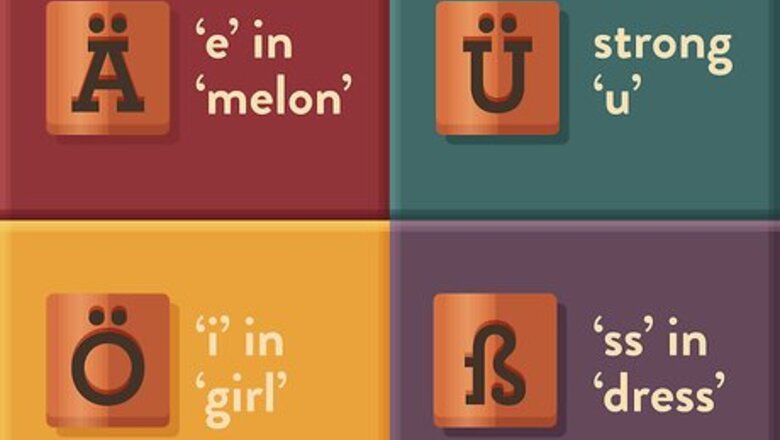
views
Establishing a Language Base
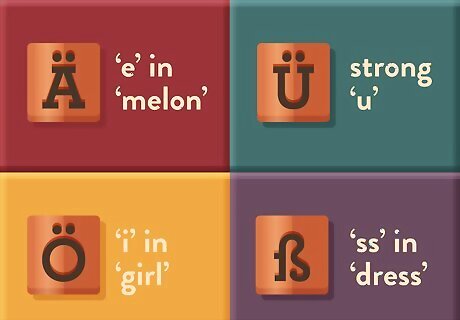
Learn the German alphabet. German has the same 26-letter alphabet as English. Plus, there are four characters that don’t exist in English, Ä, Ö, Ü, ß. Ä sounds like the ‘e’ in melon Ö sounds like the ‘i’ in girl Ü has no corresponding English sound but sounds like a strong ‘u’ ß sounds like a double ‘s’ in dress
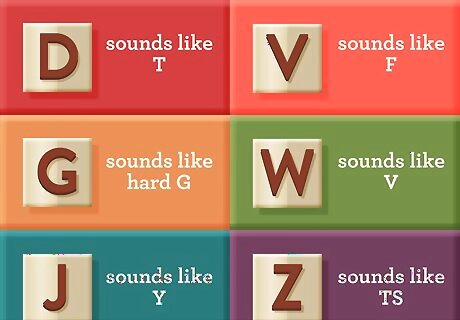
Learn German pronunciation. Competence in reading is closely related to competence in pronunciation. Distinctive features of German pronunciation include: D sounds like T G often sounds like a hard G J sounds like Y V sounds like F W sounds like V Z sounds like TS
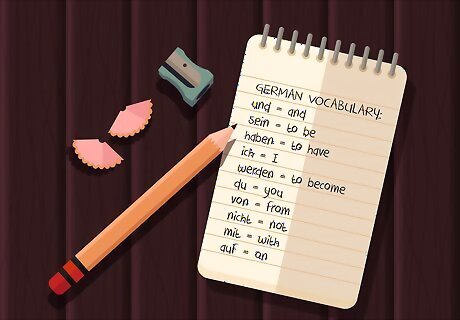
Learn fundamental vocabulary. Learn basic words before focusing on specialized words. This will help you to learn more efficiently. Many languages consist of a core set of 750 vocabulary words that are used in roughly 60 percent of all communication. und = and sein = to be haben = to have ich = I werden = to become du = you von = from nicht = not mit = with auf = on für = for er = he sie = she/her or they/them ihm = him

Learn fundamental German phrases. Learn the following phrases to start getting an understanding of how German works. Excuse me. = Entschuldigen Sie. (ent-shool-dee-gen zee) How are you? = Wie geht es dir? (vee gayt ess deer) Can you help me? = Können Sie mir helfen? (ker=nen zee meer hell-fen) I don’t understand. = Ich verstehe nicht. (ikh fehr-shtay-uh nikht) I’m hungry. = Ich habe Hunger. (ikh hah-buh hoong-er) Do you speak English? = Sprechen Sie Englisch? (spreh-khen zee eng-glish) Thank you. = Dankeschön. (dong-kah-shern) You’re welcome. = Bitteschön (bit-ah-shern)
Learning Basic German Grammar

Learn the gender of German nouns. All nouns in German have a gender. Learn the gender when you learn a noun and remember that all nouns must have their gender before it. Masculine = der Feminine = die Neuter = das
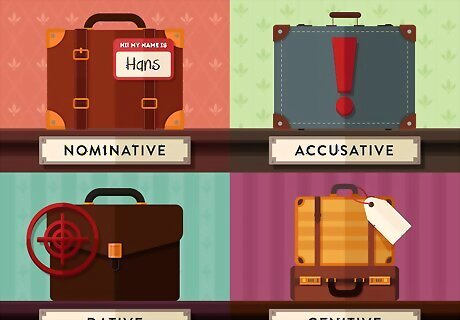
Learn the four different cases. There are four different cases that dictate the endings of adjectives, indefinite articles and which pronoun to use. Nominative: used for the person doing the action Accusative: used for the person affected by the action Dative: used to show the indirect object of a verb Genitive: used to show that something belongs to someone

Learn the different tenses of verbs. Verb tenses are used to express differences in time. It is important to learn how a verb changes tense so you know when an event takes place. Present Tense: used for all things happening in the present Simple Past: used for all completed actions Present Perfect: used for completed actions that have relevance in the present Past Perfect: used to describe a time in the past that is previous to another time in the past Future: used for all future events Future Perfect: used to separate two future events from one another
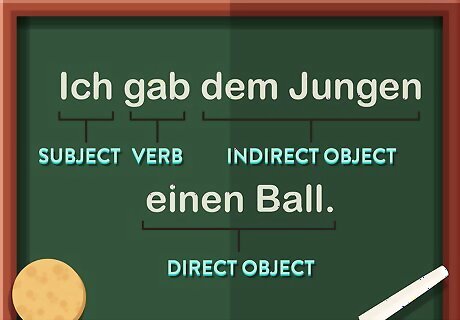
Learn German word order. German word order in a sentence is not the same as English. Typical German word order is: Subject, Verb, Indirect Object, Direct Object. But there are many cases where this isn’t true. Information should follow importance of: Time, Manner, Place. Certain conjunctions put the verb at the end of the sentence. Modal verbs make the second verb go at the end of the sentence. Relative clauses place the verb at the end of the sentence. A temporal phrase at the beginning of the sentence means the verb has to come second.
Practicing Reading

Understand the types of reading. Switch between these two ways to approach reading and you will learn better and faster. Casual reading. This is when you read to get a general understanding of the text and don’t focus on specific grammar points or vocabulary. This will improve your general knowledge and help you understand basic overall structure. Reading with intent. This is when you read with a focus on grammar and vocabulary. You should take notes while you read, refer to a dictionary, and spend a lot of time thinking about why the language is structured the way it is.This will help improve your language awareness and allow you to build foundational knowledge.

Gradually increase the level of difficulty. Start with children’s books before you try reading a novel. Read the newspaper before you try to read a legal document. Start with too difficult a text and you’ll quickly get frustrated. Some places to start: Street signs. Text on packaging. Picture books. Comic books. Fairy tales. News articles.

Maintain regular practice. It’s important to be consistent when learning a new language. The mind needs time to process new vocabulary and grammar concepts. Repetition is an important part of the process. Ask yourself these questions if you’re getting stuck or falling behind: What is preventing you from maintaining regular practice? Are you getting frustrated due to unrealistic expectations? Do you need to create or revise your learning plan? Can you relate your learning to something in your life that truly interests you?

Reward yourself for progress made. Take a look at your notes from the beginning of your studies. What have you learned? How much have you progressed? Focus on what you achieved as opposed to what you didn’t achieve. Learning a language is a lifelong process.




















Comments
0 comment